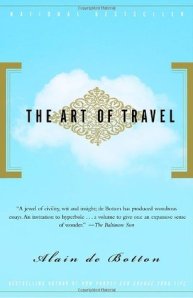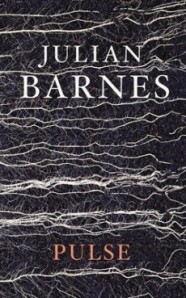Monthly Archives: May 2014
‘The Art of Travel’ by Alain de Botton
 The title was misleading. I was expecting to read about how to travel in an artistic manner or the science of artistic travel , whatever that would have been. As for the author, the only relationship till now were a few quotes, mostly from his ‘On Love’. The first few pages were more less on the expected lines – the anticipation that is mostly colored by a travel agency brochure. Palm fringed beaches, multi hued sea in shades of green , blue or a more sexy sounding aquamarine, the ubiquitous ‘hotel bungalow with a view through French doors into a room decorated with wooden floors and white bedlinen‘ and an almost always ‘azure sky.’
The title was misleading. I was expecting to read about how to travel in an artistic manner or the science of artistic travel , whatever that would have been. As for the author, the only relationship till now were a few quotes, mostly from his ‘On Love’. The first few pages were more less on the expected lines – the anticipation that is mostly colored by a travel agency brochure. Palm fringed beaches, multi hued sea in shades of green , blue or a more sexy sounding aquamarine, the ubiquitous ‘hotel bungalow with a view through French doors into a room decorated with wooden floors and white bedlinen‘ and an almost always ‘azure sky.’
You think you know it all when the author comments on , how in the course of anticipation of a travel, mortal human beings like us tend to forget the details of what happens between the time that we get into a car on the way to airport and reach the hotel at your dream destination. We get an almost bleak picture of however exotic the destination maybe, how we experience it depends to a large extent, on a lot of other factors, beyond our control. The bliss cannot be permanent, and therein lies the beauty or the reality, as the case maybe.
The book is neatly divided into five parts – Departure, Motives, Landscape, Art and Return – two chapters each, except the last, that has one. Enlightenment struck in the second chapter of ‘Departure’ where Botton talks about a remote service station somewhere between London and Manchester and connects his thoughts to the French poet Charles Baudelaire and how his poems borne out of yearning for places afar inspired the American painter Edward Hopper. This was much more than what I had hoped for. Poets and artists I’d never heard of, why they did what they did, how their travels and what they noticed in details en route affected their art and their views on people and life….literary bliss indeed.
In the first chapter ‘Motives’ of travel, Botton talks about how the very term ‘Exotic’ was synonymous with Middle East at one point of time. Did you know Gustave Flaubert hated his homeland with a passion and was obsessed with the Orient? As the author observes, “What we find exotic abroad maybe what we hunger for in vain at home,” you can’t help nodding in agreement. You also wonder whether the places that you call home are really that , or as the cliche goes, ‘isn’t home where your heart is?’
Curiosity could be another factor that prompts one to take up travel. He talks of the extreme levels of curiosity that one can go to citing the example of the German naturalist and explorer Alexander von Humboldt, who went on an expedition to South America and came back with details as diverse and detailed as to cover biology, geology, physics, chemistry and whatever else you could think of. (His biography is aptly sub titled ‘What May Be Accomplished in a Lifetime‘). If you are overwhelmed with this super human’s endeavors, Botton leaves us with a consoling thought,
“Instead of bringing back sixteen thousand new plant species, we might return from our journeys with a collection of small, unfeted but life-enhancing thoughts.”
‘Landscape’ and ‘Art’ are what really captured my heart. Serendipity strikes when you listen to Wordsworth echoing your thoughts on living in the city as against the country. It was on a visit to Red Hills in Ooty a few years ago that the fact of how your surroundings can actually affect the kind of person you are, first came into mind as a conscious thought. Every morning, Vijay, the owner of the serene home stay could be seen sitting on the green wrought iron bench in the front garden, staring at the emerald lake below. He was a man of gentle manners and I wondered whether it was the lake and its surroundings that passed on its sage like qualities to him. Over the years, I’ve noticed the changes that come over people based on where they lived and who their constant companions were at any point of time. Some places leave a lasting impression on one’s mind that you are found going back to it time and again, especially when the mind is in turmoil and longs for peace. Isn’t this what the great poet meant when he said,
“For oft on my couch I lie
In vacant or in pensive mood,
They flash upon that inward eye….
And then my heart with pleasure fills,
And dances with the Daffodils.”
The two chapters that follow goes on to tell us about what sublime is all about and how art influences our appreciation of certain things and places, which we might not have otherwise. At some time or other, most of us are influenced by the various reviews and historical significance of places and people. It is as if we are some idiots if we fail to find the same awe and wonder as others mostly pretend to. ‘On Eye-Opening Art’ tells us a different story. Botton , who is totally not impressed by the much appreciated Provence with its quintessential olive and cypress trees and wheat fields. It took aVincent van Gogh to make him appreciate the beauty of the place and its colours.
He saved the best for the last. ‘On Possessing Beauty’ is about John Ruskin, who I must admit, was someone whom I’d never heard of before. He gave a kick on my backside and how. Do we really see what we are looking at, and if at all we do, how much? According to Ruskin, humans have this innate desire to possess beauty. (That explains our hoarding mentality , I guess. The definition of what is beautiful may vary, though. ) And he says, the only way to possess it is by understanding it. And the most effective way to understand, you ask?
“by attempting to describe beautiful places through art, by writing about or drawing them, irrespective of whether one happened to have any talent for doing so.”
The catchword is of course, ‘irrespective.’ We are so worried about what others think and say of our work, all the while forgetting the real essence of art. For, isn’t art something that should give you absolute joy? Irrespective of definition, of what others term as good or bad, if it is something that gives you joy, without harming anyone else, isn’t that the ultimate aim of art? In Ruskin’s words again,
“Your art is to be the praise of something that you love. It may only be the praise of a shell or a stone.”
Art can never be separated from life. And when someone links one of the deepest longings – travel – to an object of beauty and makes you think of how you can never be really away from life and its twists and turns, with the added pleasure of finding new artists to enjoy and new authors to be read, you realize you have found a treasure, and a true one at that.
Botton says,
“I had seen many oak trees in my life, but only after an hour spent drawing one in the Langdale Valley (the result would have shamed an infant) did I begin to appreciate, and remember, their identity.”
True of people in our life as well, isn’t it?
‘The Small Brick Bridge’ by John Ruskin
Verdict : You love travel ? Art ? Poetry? Go read!
4/5 for the book and 5/5 for ‘On Possessing Beauty’
‘Pulse’ by Julian Barnes
 I fell in love with Julian Barnes with his ‘The Sense of an Ending.’ Each sentence was a gem, each thought a treasure. Even though I prefer novels to short stories, the name Barnes was enough for me to pick up this collection of his short stories. And what a pick up it was!
I fell in love with Julian Barnes with his ‘The Sense of an Ending.’ Each sentence was a gem, each thought a treasure. Even though I prefer novels to short stories, the name Barnes was enough for me to pick up this collection of his short stories. And what a pick up it was!
With the humungous list of ‘to be read’ books on the shelves – physical and virtual – if the story doesn’t hold my attention after the first few pages, it normally goes on to a forgotten shelf these days. The pile keeps increasing almost in proportion to the ones that wait impatiently to get into my hands. Following that vein, the first story was fine, a real estate agent trying to fall in love with a waitress of East European origin. As always, irrespective of the subject, it is Barnes’ verses that hooks you and then keep you dangling from that hook,
“His professional eye took in the dimensions, furnishings, and probable rental cost; his lover’s eye took in a small dressing table with photos in plastic frames and a picture of the Virgin.”
‘At Phil & Joanna’s’ is a series of conversations rather than short stories. A few couples meeting for dinner at Phil &Joanna’s and the general banter that normally happens around the dinner table. There are four of these ‘stories,’ each more interesting than the other. The easy camaraderie, the instant repartee’s and witty observations, how people who are close to each other move quickly from one topic to another, relate each to the other and then come back to the original topic, in a warm, friendly banter….I just loved the series. It was as if I was sitting at that table and listening to some of my close and like minded friends.
The book is in two parts. I have nothing against the stories in part one, in fact the last one there, ‘Marriage Lines’ is what touched me the most. There I was, seated in a crowded bus, not able to control my laughter reading one of the conversations at the by now familiar table, when the next story caught me by the throat and tears started rolling down my cheeks. The protagonist comes back to an island where he had visited with his wife before they were married, for their honeymoon and for many years after that. This time, he is alone. As he goes through his memories, we see a life as many of us know: one that starts with a fool hardy optimism that ours is going to be the most perfect ever married life, then reality creeping in and finally how you find a rhythm that flows in tandem between the two of you. When vthat special one in your life leaves you alone all of a sudden, you are at a loss as to how to grieve and you go back to places that were familiar to both of you, where you made beautiful memories together.
“He had thought he could recapture, and begin to say farewell. He had thought grief might be assuaged, or if not assuaged, at least speeded up, hurried on its way a little, by going back to a place where they had been happy. But he was not in charge of grief. Grief was in charge of him. And in the months and years ahead, he expected grief to teach him many other things as well. This was just the first of them.”
The sheer brilliance of the master story teller comes out in the five stories of part Two. ‘The Limner’ is the poignant story of Wadsworth, the mute Limner who sees, hears and perceives far beyond what his clients think. ‘Complicity’ is about what makes two people get attracted to each other, how do we know what the other person is all about, what do we search for in another, the unrelated thoughts that go through our mind as we assess a potential partner and finally how everything comes to together in a moment and gives us a go ahead signal.
A blind prodigy and an unconventional doctor who tries to cure her are the central characters in ‘Harmony.’ As the doctor probes into the reason behind the girl’s blindness, we come face to face with the different characters that are at loggerheads with each other and oppose each step for their own selfish reasons. Is it that many of us consciously do not want things or people to improve so that the harmony of our lives are not upset? Do we really care about even our near and dear ones or are we more concerned about our own comforts? The girl’s first vision of a starlit sky stays with you,
“she did not want words to interfere with her sense of wonder, and continued to look until her neck hurt. From that evening on, visual phenomena of any distinction were automatically compared to a starry sky – and found wanting.”
‘Carcassone’ is about Garibaldi and his wife Anita Riberas and also about love at first sight and how our language is incapable of representing that ‘lightning strike and thunderclap of love.’ How do we know at that moment that this is ‘the’ person? Do we even need to experience that flashlight of recognition? And then he says in that exquisite manner that is his trademark,
“even the deepest and the longest love relationships rarely start with full recognition, with ‘you must be mine’ pronounced in a foreign tongue. The moment itself may be disguised as something else: admiration, pity, office camaraderie, shared danger, a common sense of justice.”
Isn’t this what has happened and happens to so many of us?
And finally, the title story, ‘Pulse’. What can I write about it? A husband who is losing his sense of smell, a wife who gets clumsier by the day and a son who is unable to form lasting relationships. The son’s affinity and attachment to his parents are total and mostly unequivocal. Is it why he is unable to sustain his attention with anyone? Is it because his ideal is so perfect that he loses his life in his pursuit of a similar life? If so, does children of such parents always have bad marriages? As for the husband and wife, their closeness to each other is so subtle. It is so heartrendingly described in the son’s words as he come to know that his mother doesn’t have too many days to live.
“I kept thinking: Mum’s dying, but Dad’s losing her”
There’s only one word I can use to describe his stories, ‘Brilliant!’ The sheer elegance of his language has to be read by yourself, it can never be described by another.
I have fallen head over heels in love, again!
Verdict – Go, read it! At least the stories in Part Two
4/5 (5/5 for Part Two and ‘Marriage Lines’)

